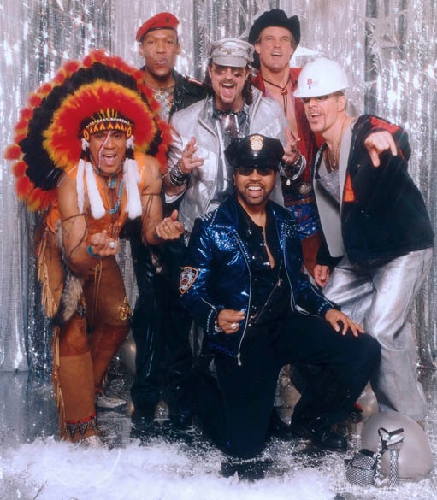Never-ending stay at ‘Y.M.C.A.’: Village People visit Las Vegas
The Village People were wrapping up a recent concert with their hit "Y.M.C.A." when the crowd rushed the stage.
As the first notes of the song filtered through the audience, more than 200 Midwesterners pushed their way forward, drinks in hand, and surrounded the disco icons.
It's happened before -- "Y.M.C.A." quite possibly raises the dead, says the group's American Indian, Felipe Rose -- and they got through the number. But it was kind of scary. There was no security to fend off the enthusiastic fans.
"I just don't know why anyone would think of rushing the stage," Rose says by phone from his Asbury Park, N.J., apartment. "I still don't get it."
The Village People kicked off a 10-show run at the Riviera's Starlite Theatre on Wednesday . Performances start at 7:30 p.m. today through Sunday and again Nov. 16 to 20.
Even after 35 years as an original group member, witnessing audience reaction to their uniquely American style, Rose can't explain why the Village People have endured.
The group has sold more than 100 million records. They have left an undeniable mark on pop culture. They were so popular in the late '70s, the U.S. Navy almost used the group's song "In the Navy" to recruit. Baseball stadiums across the country regularly play "Y.M.C.A." during games, and the song's dance moves are indelibly etched into humanity's subconscious.
"Breaking down the reasons why the Village People have lasted so long is like breaking down a glass of milk," says Rose, 57. "Why is it good for you and why do people like it? I don't know."
The group was created in 1977 in New York by producer and composer Jacques Morali, who died from AIDS in 1991. His partner, Henri Belolo, now produces the group.
The Village People's rise on the disco scene was immediate. After a concept album was recorded and released, hungry disco audiences clamored for live shows, says David Hodo, the group's construction worker. Morali cast dancers and singers to play American male archetypes: a cop, a cowboy, a construction worker, a soldier, an American Indian and a leather man.
Hodo, 65, responded to an ad that read: "Macho types wanted. Must dance and have a mustache."
What the mainstream public didn't know was that the characters were inspired by the gay subculture of Greenwich Village.
"I feel so naive," says Frank DeCaro, pop culture expert, Sirius satellite radio host and author of "The Dead Celebrity Cookbook." "There I was, a teenager in the '70s. I didn't know they were gay archetypes turned into a band. Who knew? They sort of snuck in under the radar, even with the people who were not predisposed to enjoy a band from the gay subculture."
The music resonated with mainstream audiences because it was fun and hopeful.
"Their message was a very positive one," DeCaro says. "It was very celebratory. They not only guaranteed a great party, but they also had this message of positivity that things were going to be better."
It seems simple now, says the group's soldier, Alexander Briley, 60. But in the 1970s, this just wasn't done. Plenty of bands wore costumes, but there was nothing like the Village People.
"We were so different; you didn't see anybody putting together characters like that," says Briley, an original member.
The concept worked until the 1980s came along and the group struggled to find an identity in a music scene that rejected disco and embraced all forms of rock music. The group split up for 13 months, reuniting in 1987 with three original members -- Hodo, Rose and Briley -- and three new members.
They chose to focus on touring and performing at private parties, bar mitzvahs, corporate events and music festivals. Disco dance music enjoyed a resurgence in the late 1990s, Rose says, and the Village People rode that wave. In 2004, they performed as the opening act for Cher during her Farewell Tour.
Over the years, members have left the group and been replaced for a variety of reasons. Victor Willis, the original Village People cop who left the group for good in 1982, was arrested several times on drug charges. The original biker, Glenn Hughes, died of lung cancer in 1991. Some left to pursue other, less strenuous careers.
Touring is hard on the body and mind, Rose says, but the group's willingness to travel and perform year-round has helped extend their career over three decades.
Their Vegas show, "The Village People: Hot, Raw and Live," will feature new interpretations on their music, Rose says. There will be stage props and lots of bells and whistles. The group hopes that they can take this new, revamped show on the road, in place of their old one.
But maybe not, Rose says. They've learned a lot in those 35 years of touring, and they plan to apply those lessons to the Vegas show. Especially the No. 1 lesson:
Do not leave without playing "Y.M.C.A."
Contact reporter Sonya Padgett at spadgett@reviewjournal.com or 702-380-4564. Follow @StripSonya on Twitter.
PREVIEW
What: Village People's "Hot, Raw and Live"
When: 7:30 p.m. today through Nov. 13 and Nov. 16-20
Where: Starlite Theatre, Riviera, 2901 Las Vegas Blvd. South
Tickets: Starts at $45 (rivierahotel.com, 794-9433)






















